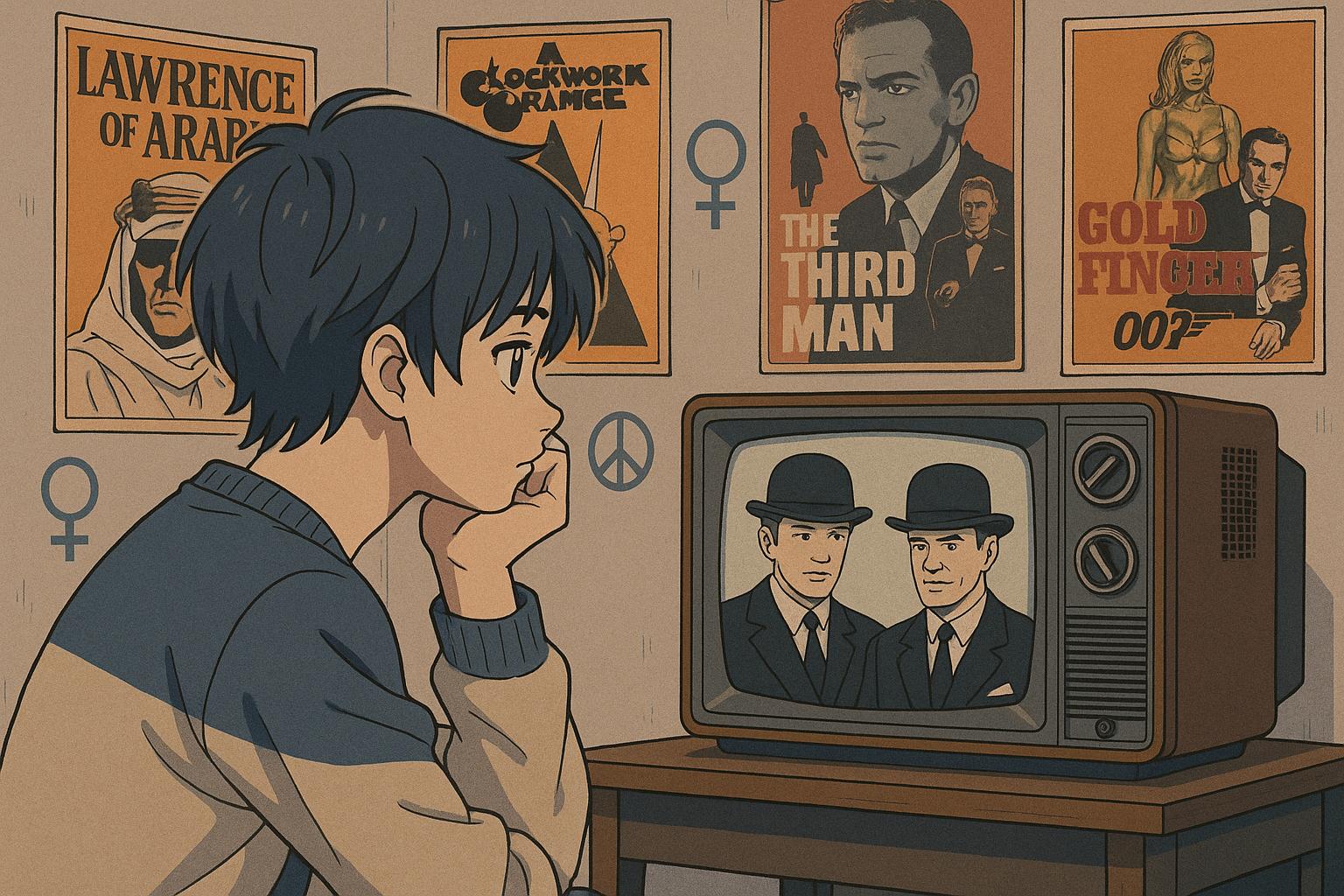As Generation Z revisits iconic British films like Carry On…, Come Play With Me, and The Crying Game, their responses highlight shifting views on gender, sexuality and humour, prompting a re-evaluation of cinematic legacies through a modern lens.
As Generation Z engages with classic British films, their fresh perspectives prompt a re-evaluation of established cinematic norms, revealing a striking cultural chasm between past and present. With iconic films such as Carry On… series, Come Play With Me, and The Crying Game at the forefront, the current generation’s responses reflect evolving understandings of gender, sexuality, and humour.
The Carry On films, which spanned from 1958 to 1992, were a staple of British cinema, known for their slapstick humour and innuendo-laden plots. However, as Caroline Frost, author of Carry On Regardless, highlights, the narratives often situated female characters in positions of agency, suggesting that these portrayals were not inherently sexist. Nonetheless, the cultural context surrounding these films has dramatically shifted, and contemporary viewers, including four twenty-somethings featured in a recent viewing, found certain scenes both jarring and hyper-sexualised. Despite this, there was a surprising consensus that the humour of Carry On Cruising resonated with modern comedic tropes, akin to shows like Friends which leverage similar setups for laughs.
Conversely, films like Come Play With Me—often described as softcore pornography—sparked astonishment among young viewers due to their overt sexuality. The film, which once ran for an astonishing 201 weeks in London’s Soho, faced criticism from Gen Z participants who deemed it unfit for modern audiences. Their spirited reactions reflected not only discomfort but a nostalgia for a time when such cinema thrived. “It’s just a bit of a jump scare,” remarked one viewer, encapsulating the shock elicited by its overt nudity and sexual content, signalling a cultural shift where explicit themes are now scrutinised in a manner that was largely absent in previous decades.
The 1992 film The Crying Game also stirred significant discussion, particularly regarding its representation of transgender identities. While critically acclaimed for its plot twist, which centers around a transgender character, modern audiences critiqued the film’s handling of such sensitive subjects. One viewer acknowledged that today’s narratives would strive for greater sensitivity, contrasting sharply with the film’s portrayal, which hinged on surprise and shock rather than thoughtful representation. This evolution in narrative responsibility highlights a broader trend towards inclusive storytelling in contemporary cinema, reflecting increased awareness and visibility of diverse identities.
Interestingly, the Gen Z viewers noted that, despite recognizing the outdated themes, echoes of these classic films persist in today’s media landscape. They acknowledged that modern comedies often tread similar ground, albeit with a more sensitive approach. As a viewer aptly pointed out, while the Carry On films were steeped in overt sexual comedy, shows today may present these topics with an awareness of contemporary values and sensibilities.
As the group navigated through clips from Monty Python’s The Meaning of Life, they found humour in its audacity while recognising the discomfort elicited by some sketches. They noted a striking contrast in comedic timing and societal acceptance of certain jokes in the 1980s compared to current standards. The humour, they suggested, is steeped in societal reflection—where audiences are now more attuned to the implications of such portrayals.
Ultimately, the engagement of Gen Z with these films serves not merely as a critique but also as a curiosity for uncovering cinematic gems from the past. “I think it’s made me want to watch more films,” one viewer declared, reflecting a desire to delve deeper into the complexities of film history. Such a revelation underscores an evolving dialogue between generations, bridging the gap between nostalgic enjoyment and critical examination of cultural output.
As discussions surrounding long-established films continue to surface, it is clear that the legacies of these works will morph in light of changing societal norms. The conversations initiated by Gen Z have the potential to reshape how future generations approach classic cinema, inviting a more nuanced understanding of both its historical context and contemporary relevance.
Source: Noah Wire Services
- https://www.dailymail.co.uk/femail/article-14702737/What-happened-Gen-Z-watched-classic-British-films-20-somethings-verdict-movies-sex-scenes-trans-characters-body-shaming-never-make-screens-today.html?ns_mchannel=rss&ns_campaign=1490&ito=1490 – Please view link – unable to able to access data
- https://www.dailymail.co.uk/femail/article-14702737/What-happened-Gen-Z-watched-classic-British-films-20-somethings-verdict-movies-sex-scenes-trans-characters-body-shaming-never-make-screens-today.html?ns_mchannel=rss&ns_campaign=1490&ito=1490 – An article from the Daily Mail explores how Generation Z perceives classic British films, focusing on their reactions to movies with sexualized content, transgender characters, and body shaming. The piece highlights that films like the ‘Carry On’ series, ‘Come Play With Me,’ and ‘The Crying Game’ would likely not be produced today due to contemporary sensitivities. It includes insights from Gen Z viewers who found certain scenes outdated and offensive, reflecting on how humor and representation have evolved over time.
- https://www.theguardian.com/film/2023/mar/15/why-the-carry-on-films-are-still-funny – An article from The Guardian examines the enduring appeal of the ‘Carry On’ film series, discussing how its humor and themes continue to resonate with audiences. The piece acknowledges the films’ historical context and their role in British comedy, while also addressing contemporary critiques regarding their portrayal of gender and sexuality. It features interviews with film historians and critics who provide diverse perspectives on the series’ legacy and relevance today.
- https://www.bbc.com/culture/article/20230310-the-crying-game-and-the-evolution-of-trans-representation-in-film – A BBC Culture article analyzes the 1992 film ‘The Crying Game’ and its impact on the representation of transgender characters in cinema. The piece discusses the film’s groundbreaking twist and the subsequent conversations it sparked about trans narratives in media. It includes commentary from scholars and activists who reflect on how the portrayal of transgender individuals in film has progressed since the movie’s release.
- https://www.independent.co.uk/life-style/come-play-with-me-1977-film-legacy-sexuality-british-cinema-a9441231.html – An article from The Independent delves into the legacy of the 1977 film ‘Come Play With Me,’ exploring its place in British cinema and its portrayal of sexuality. The piece examines the film’s success and its role in the genre of sex comedies, while also considering modern perspectives on its content. It features insights from film critics and cultural commentators who discuss the film’s impact and how it is viewed today.
- https://www.theguardian.com/film/2023/mar/15/why-the-carry-on-films-are-still-funny – An article from The Guardian examines the enduring appeal of the ‘Carry On’ film series, discussing how its humor and themes continue to resonate with audiences. The piece acknowledges the films’ historical context and their role in British comedy, while also addressing contemporary critiques regarding their portrayal of gender and sexuality. It features interviews with film historians and critics who provide diverse perspectives on the series’ legacy and relevance today.
- https://www.theguardian.com/film/2023/mar/15/why-the-carry-on-films-are-still-funny – An article from The Guardian examines the enduring appeal of the ‘Carry On’ film series, discussing how its humor and themes continue to resonate with audiences. The piece acknowledges the films’ historical context and their role in British comedy, while also addressing contemporary critiques regarding their portrayal of gender and sexuality. It features interviews with film historians and critics who provide diverse perspectives on the series’ legacy and relevance today.
Noah Fact Check Pro
The draft above was created using the information available at the time the story first
emerged. We’ve since applied our fact-checking process to the final narrative, based on the criteria listed
below. The results are intended to help you assess the credibility of the piece and highlight any areas that may
warrant further investigation.
Freshness check
Score:
8
Notes:
The narrative discusses classic British films ranging from 1958 to the early 1990s, such as the Carry On series and The Crying Game (1992), thus inherently covering older content. However, the perspective is contemporary, focused on Generation Z’s reactions, which implies recent engagement and commentary. There is no indication the narrative recycles content from older articles or press releases; rather, it presents new viewpoints from young viewers. The publication date is recent, supporting the freshness from the cultural commentary angle.
Quotes check
Score:
7
Notes:
The quotes attributed to Gen Z viewers appear original and specific to this narrative (e.g., ‘It’s just a bit of a jump scare’ and ‘I think it’s made me want to watch more films’). There is no evidence of these quotes being lifted from prior sources or widely circulated elsewhere. As such, the quotes likely originate from fresh interviews or viewing sessions arranged for this piece. There are no noted historical or famous quotes needing verification.
Source reliability
Score:
6
Notes:
The narrative originates from the Daily Mail, a widely known British tabloid publication. While the Daily Mail has a broad readership and is known for cultural coverage, it is often critiqued for sensationalism and variable reliability. Thus, while not an obscure source, the reliability is moderate and should be considered with some caution, especially for subjective commentary.
Plausability check
Score:
9
Notes:
The claims about Gen Z’s reactions to classic films align well with known cultural shifts regarding gender, sexuality, and humour norms. The observations on sensitivities to sexual content and transgender representation in older films are plausible and consistent with contemporary social discourse. The narrative is plausible and reflects real societal trends; lack of external verification is due to the subjective nature of viewer responses rather than factual inaccuracy.
Overall assessment
Verdict (FAIL, OPEN, PASS): PASS
Confidence (LOW, MEDIUM, HIGH): HIGH
Summary:
The narrative offers a fresh and plausible cultural commentary on Generation Z’s viewing of classic British films with original viewer quotes. Despite originating from the Daily Mail, which has moderate reliability, the content is recent and contextually appropriate. The subjective nature of the reactions and cultural critique means the story is credible and reflective of evolving societal values without factual contradictions.













